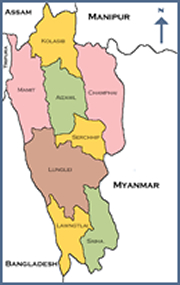Mizoram, the dry North Eastern state of India has started producing wine with introduction last month of a small quantity of ‘Zawlaidi’ label which means love-potion in the Mizo language, thus achieving the unique distinction of becoming perhaps the only wine producing region in the world, which otherwise continues to enforce prohibition and several groups opposing wine production.
 Mizoram is one of the Seven Sister States in North Eastern India, sharing borders with the states of Tripura, Assam, Manipur and with the neighboring countries of Bangladesh and Myanmar. It became the 23rd state of India on 20 February 1987 with Aizawl as its capital-after years of insurgency. The state has been under dry law for 13 years, as the Mizoram Liquor Total Prohibition Act was enforced in the state two years after formulation, on February 20, 1997. Wine processing from grapes was allowed in the state after the act was amended in April 2007.
Mizoram is one of the Seven Sister States in North Eastern India, sharing borders with the states of Tripura, Assam, Manipur and with the neighboring countries of Bangladesh and Myanmar. It became the 23rd state of India on 20 February 1987 with Aizawl as its capital-after years of insurgency. The state has been under dry law for 13 years, as the Mizoram Liquor Total Prohibition Act was enforced in the state two years after formulation, on February 20, 1997. Wine processing from grapes was allowed in the state after the act was amended in April 2007.
The main reason of this progressive amendment was to increase the earning opportunities for the local villagers who produce bumper crops of grapes but are unable to sell them. In Hnahlan village about 540 families, around 80 % of the total population, has been engaged in grape production whereas 325 families in Champhai area near the Myanmar border, have been engaged in the new activity. According to reports, Hnahlan is expected to produce around 700 cases of wine and Champhai 1000 cases.
Each bottle is priced at Rs 170- slightly higher than the similar fortified ‘Ports’ being produced in Goa and Maharashtra. Wine is allowed to be sold only in Mizoram for the moment. The Excise department of Mizoram has directed that the quantity of the wine should be limited to four liters per person.
As already reported in delWine, a co-operative society had been set up by the cultivators as Grape Growers Society, with Vanlalruata Chenkual, the District Horticulture Officer of Khawzawl as its managing director. Champhai Grape Growers Society harvested 478.5 quintals of grapes this year and expects to harvest 2,056 quintals during 2010-11. Hnahlan Grape Growers Society harvested 6916 quintals and expects the crop of 7910 quintals this year.
The state excise laws dictate that wine has to be sold through licensed retail shops only and before 5 pm. It is interesting that the legal age for wine buyers and sales persons is 18; it is 25 for buyers in most of the other Indian  states, though the sales persons may be above the age of 21 as each state is free to have its own laws and policies for marketing wine and alcoholic products.
states, though the sales persons may be above the age of 21 as each state is free to have its own laws and policies for marketing wine and alcoholic products.
It is acknowledged by Christians that Jesus changed water into wine. It even seems that Jesus drank wine on occasion.
But the Bible also condemns drunkenness and its effects. The sale of the locally produced wine has been banned within weeks of being launched in one of the localities in the capital city of Aizawl after it was opposed by a committee comprising of different NGOs and the Church of the Christian dominated state.
The churches in Mizoram, who were behind the prohibition law, have expressed their resentment on the liberalization of grape wine.







0 comments:
Post a Comment